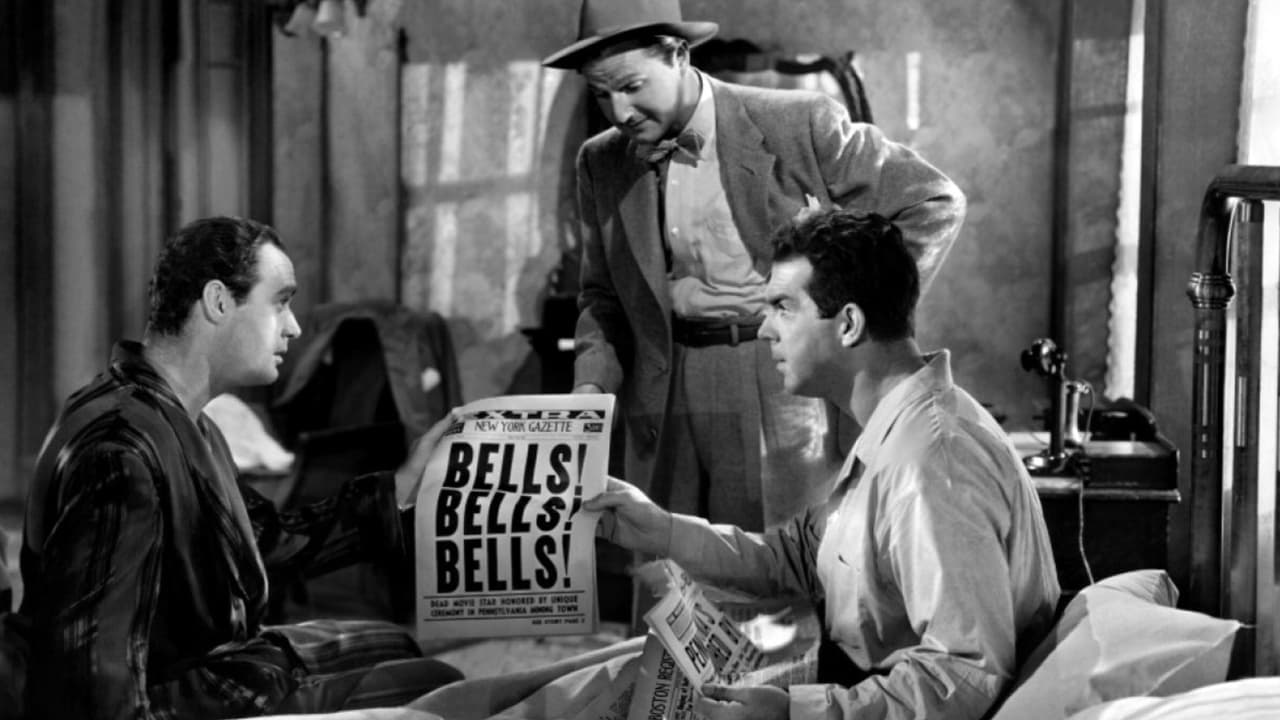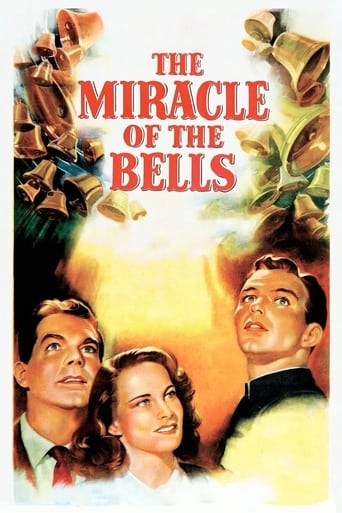



The Worst Film Ever
Strong and Moving!
The film makes a home in your brain and the only cure is to see it again.
View MoreYour blood may run cold, but you now find yourself pinioned to the story.
View MoreI grew up thinking this was a clinker and couldn't even eclipse Thr Kissing Bandit or Double Dynamite in terms of Sinatra bow-wows; boy, did I get a wrong number. As a Sinatra fan and completist I would have bought a DVD anyway and will do so as and when -let's face it, I own On The Town, The Pride And The Passion, Marriage On The Rocks, and I will buy though not necessarily watch Four For Texas, Sergeants Three when they turn up. But now having seen it on TV I am actively seeking Miracle Of The Bells and not just as a Sinatra fan. I find myself in agreement with the majority of those who have written here and found this to be a warm 'little' film about goodness and faith. Valli is an ideal actress for the lead and Lee J Cobb is fine as a Studio head though a tad on the humane side to be modelled on anyone we know. Very well worth watching.
View MoreI had absolutely no knowledge of the "Miracle of the Bells" when it came on TV in a colorized version a number of years ago, as one of those SFM or Hallmark weekend special presentations (a recurring image I recall was bells pealing and swinging as the announcer said "And now back to the Miracle of the Bells"). It started out as Fred MacMurray playing the type of hardboiled role he was known for in his film noir movies, this time mysteriously appearing in a small town to arrange a funeral. I admit it--the movie grabbed me as the funeral proceeded and the background of the movie's characters slowly became unveiled, and the tension built through various plot twists until the eventual happy ending (face it, it's just about impossible to review this movie without giving away much of the plot). I never saw the movie again until Turner Classics unearthed it again for a holiday showing--and its magic was as strong as ever.I might give a little advisory here--contrary to other reviews, Frank Sinatra was not in this movie, at least not for me. When I first saw this movie, I didn't connect the priest in any way with the very well-known rough Rat Packer of the 1960s and 1970s. That's maybe why I took the character at face value, a green kid presiding over a parish that has seen its better days, but by flashes he increasingly shows the growing capacity to meet the phenomenon that is overtaking him and his flock. Of course I recognized him this time around, but Frankie's performance still holds up for me.The leading lady's performance was absolutely luminescent, and that scene at the Chinese restaurant was indeed a gem as others have pointed out. And MacMurray is definitely at the heart of this movie, his chemistry with Cobb, Sinatra, and Valli (and later with the reporters) is what makes the whole story work--certainly has to be one of the highlights of a great career. The title is strange in a way, in that the movie (and reviewers) go out of the way to emphasize there is nothing really miraculous about the events of this movie. I venture to disagree. There is something miraculous about the way these events worked on the characters of the leads, so that MacMurray, Sinatra, Cobb and the population of Coaltown itself are far different people at the end of the movie than at the beginning. Yeah, it's not perfect, the movie does lag and hit its points with a heavy hammer in spots, but, to steal a line from another miracle movie, "Miracle on 34th Street"-- this movie was declared special and a classic on TV years ago, and years later I have to say, professionally and personally I have to agree with them!
View MoreI don't mean to be disrespectful, but the fact that this film may be based on a true story makes the whole thing insaner than it really is. The dialogue alone may have you roaring in the aisles. Frank Sinatra as a priest with a priestly voice even sings a song and Fred McMurray towering over Sinatra as he stands next to him tries to act convinced and at times he almost succeeds. The one remarkable feature here is Alida Valli or as she was billed "Valli" trying to sell her as the new Garbo. She is stunningly beautiful. You wouldn't guess it for her performance here but she went on to star for Luchino Visconti in "Senso" and years later for Bernardo Bertolucci in "The Spider's Stratagem" What she's asked to do here is virtually impossible. To makes us care, let alone believe in what she's suppose to be telling us and yet, there is something, don't ask me what but something, that makes "The Miracle Of The Bells" a guilty pleasure of major proportions.
View MoreHaving viewed Miracle of the Bells at least 20 times, I still get inspired by its central theme, that the world is a good place and we can each make it a little better. What many "Bells" viewers might not know is that the (Alida) Vali role is based on a historical person named Olga Treskovna who came from Northeastern Pennsylvania. Some exteriors and rear-screen projection scenes were shot in and around Glen Lyon and Nanticoke, PA (where much of the action takes place). The real Olga Treskovna is buried in St. Michael's Cemetery (of course the Parish cemetery of St. Michael's Church which has recently been razed.) The real statue of St. Michael, however, is at this writing still in the church yard. After more than half a century, it's still an inspirational movie with great performances from Lee J. Cobb, Fred Mac Murray and Vali despite several warts of weak acting here and there by others.
View More